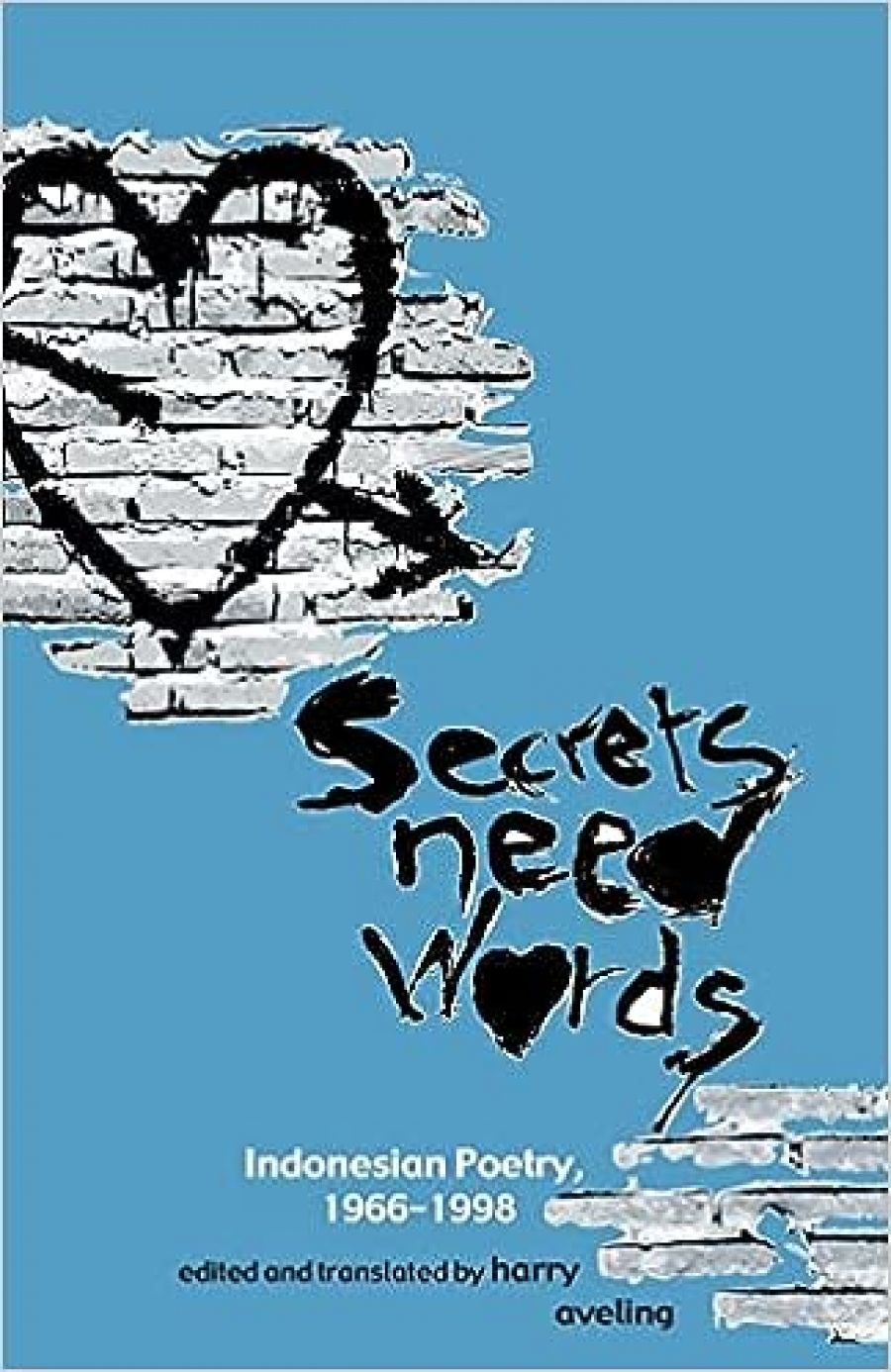
- Free Article: No
- Contents Category: Poetry
- Review Article: Yes
- Article Title: The Indonesian Other
- Online Only: No
- Custom Highlight Text:
In Australia, despite having Indonesian as one of the languages commonly available to students in primary and secondary school, and despite having departments of Indonesian Studies in all the major universities, the literature of the world’s third most populous country and ‘our closest neighbour’ is not well known. It is mostly the province of academic specialists, not general readers. The reason for this is partly cultural in that Australian readers, particularly readers of poetry, tend to be more interested in American, European or British poetry, and partly a consequence of the poor support given to the art of translation. Yet two of the best-regarded translators of Indonesian literature, Harry Aveling and Max Lane, reside in Australia.
- Book 1 Title: Secrets Need Words
- Book 1 Subtitle: Indonesian Poetry, 1966-1998
- Book 1 Biblio: Ohio University Press, 389 pp
- Book 1 Cover Small (400 x 600):

- Book 1 Cover (800 x 1200):

To a certain extent, the bilingual anthology Secrets Need Words follows the precedents of Aveling’s previous anthology, Contemporary Indonesian Poetry (1975), and his work of criticism, Thematic History of Indonesian Poetry: 1920–1974 (1974). Secrets Need Words gathers a selection of poems from the earlier anthology – work by the established poets Rendra, Goenawan Mohamad, Taufiq Ismail, Sapardi Djoko Damono, Subagio Sasatrowardjo, Ajip Rosidi and Toeti Heraty – and includes a large amount of new work. Also included are a number of important poets whose work Aveling has translated elsewhere.
Secrets Need Words differs substantially from Contemporary Indonesian Poetry in that this book doesn’t rely on the conventional structure of the anthology: the segmenting of work into what becomes in effect a number of little collections of individual poets. Instead, Aveling has divided the book into two parts, the first titled ‘The Generation of 1966’, and the second ‘The Post-Indonesia Generation’. This division of the poetry into two generations is subdivided into chapters concerned with various themes: ‘Nature and Irony’, ‘The World Become Absurd’, ‘The Renewal of Islam’ and ‘A New Openness’, to name a few. Each subdivision starts with a concise essay placing the poetry that follows in socio-historical context. The advantage of this approach is that it gives the new reader a sense of the poetry’s engagement, be it political, literary, religious or personal. But its disadvantage for those familiar with Indonesian poetry is that it historicises the texts, placing them within the realm of socio-political debate, regarding them as evidence of historical circumstance. In light of the general ignorance of Indonesian poetry, this is effective; however, to a reader expecting the contextualisation of literary history, it can be frustrating.
Secrets Need Words is an interesting argument about Indonesian literature. The introductory essays and the thematic structure of the book set up readings of the poems not always in keeping with the poems themselves. Some of the poems could have been collected under more than one theme. Often works by one poet appear in several sections. This is consistent with the logic of the structure, but a side-effect is that in few cases is it possible to gain a sense of an individual poet’s oeuvre. A few selections stand out in this regard. The poems by Darmanto Jatman, Sutardji Calzoum Bachri and Dorothea Rosa Herliany give a fair indication of what they have written, while many of the other poets are represented by poems that do not give a sense of their range of concerns or their distinctive styles. So the effect of Secrets Need Words can be slightly disorientating, particularly when a figure like Rendra, famous for his performances and narrative poems and by far the most famous poet in Indonesia, is presented as being merely one among many other poets. But then the positive effect of this disorientation is the prospect that it can upset the canon and allow newer poets to come to prominence.
The newer poets in the anthology are Dorothea Rosa Herliany, Setok Srengene, Afrizal Malna and Acep Zamzam Noor. There are also the older poets like Abdul Hadi, Arifin C. Noer and Linus Suryadi whose work is important, though not as well known as that of Renda or Sapardi Djoko Damono. I was pleased to rediscover the experimental work of Darmanto Jatman, Sutarji Calzoum Bachri and the mystical poems of Abdul Hadi, as well as the canonical works of Sitor Situmorang, Damono and Rendra, in particular his famous political poem ‘Prostitutes of Jakarta – Unite!’ which concludes with the lines: ‘Prostitutes of Jakarta / My sisters / Do not tremble before men / When quite easily / you can strip the fakes / Double your prices / let them flounder / Strike for a month / soon they will be committing adultery / with their brothers’ wives.’
As Indonesian literature is written in a language which, in its present form, is less than a century old, any compilation of its poetry is perhaps as much a proposal of suggested reading as a canon of recommended works. I suspect that Secrets Need Words, like any engaging anthology of literature in translation, will both cause the poets included to reflect on their own work in new ways, as well as to perform the essential function of an anthology of translations – introducing readers to an ‘other’ and powerful literary tradition.


Comments powered by CComment